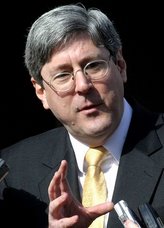
Responsibility for the disaster of Iraq lies not only with the President of the United States, but also with the Joint Chiefs of Staff. The president needs expert and candid military counsel. Not yes-men in uniform....
Excerpted from article in Boston Globe by Andrew J. Bacevich June 17, 2007
History will render this judgment of Pace, who succeeded General Richard B Myers as chairman in September 2005: As U. S. forces became mired ever more deeply in an unwinnable war, Pace remained a passive bystander, a witness to a catastrophe that he was slow to comprehend and did little to forestall. If the position of JCS chair had simply remained vacant for the past two years, it is difficult to see how the American military would be in worse shape today.
Softening history's verdict will be this fact: Long before Pace arrived on the scene the JCS had established a well-deserved reputation as one of the most ineffective institutions in Washington. Dissatisfaction with the Joint Chiefs dates virtually from the moment in 1947 when Congress passed the legislation creating it. Trying to fix the JCS soon became a cottage industry. The widespread unhappiness with Pace's performance, culminating in his de facto firing, affirms that these various reforms have failed.
Expectations that a permanent mechanism for providing military advice could improve the quality of civilian decision-making inspired the creation of the Joint Chiefs in the first place. After all, this had seemingly been the case during World War II, when Franklin Roosevelt had created a precursor of the modern JCS whose members had collaborated effectively with FDR in successfully directing a massive global war.
Softening history's verdict will be this fact: Long before Pace arrived on the scene the JCS had established a well-deserved reputation as one of the most ineffective institutions in Washington. Dissatisfaction with the Joint Chiefs dates virtually from the moment in 1947 when Congress passed the legislation creating it. Trying to fix the JCS soon became a cottage industry. The widespread unhappiness with Pace's performance, culminating in his de facto firing, affirms that these various reforms have failed.
Expectations that a permanent mechanism for providing military advice could improve the quality of civilian decision-making inspired the creation of the Joint Chiefs in the first place. After all, this had seemingly been the case during World War II, when Franklin Roosevelt had created a precursor of the modern JCS whose members had collaborated effectively with FDR in successfully directing a massive global war.
..., instead of military professionals offering disinterested advice to help policymakers render sound decisions, the history of this civilian-military relationship is one of conniving, double-dealing, and mutual manipulation. As generals increasingly played politics, they forfeited their identity as nonpartisan servants of the state. Presidents Harry Truman, Dwight D. Eisenhower, and John F. Kennedy, each for different reasons, came to see the members of the Joint Chiefs as uniformed political adversaries.
Although himself a five-star general, Eisenhower railed in private throughout his presidency about members of the Joint Chiefs conspiring to undermine his policies whenever they happened to collide with cherished interests of the military services. His Farewell Address, warning that the "military-industrial complex" could well "endanger our liberties or democratic processes," amounted to a tacit admission that as commander-in-chief he had lost control of his generals.
....In his now-classic 1997 book, "Dereliction of Duty," Colonel H. R. McMaster, an active-duty army officer who has served in Iraq with considerable distinction, described how a civil-military relationship based on mutual dishonesty and suspicion reached its pre-Iraq low-point during the US intervention in Vietnam. In his blistering indictment, McMaster charged the Joint Chiefs of Staff of the early 1960s -- the "five silent men," he called them -- with complicity in the lies and deceptions that produced the debacle of that war.
During Operation Desert Storm, (Colin Powell) ...convinced President George H. W. Bush to end the ground war after just 100 hours; he insisted that U. S. forces after the Cold War retain the capability to fight two large-scale conventional wars simultaneously; he questioned the wisdom of humanitarian intervention in the Balkans and elsewhere; and he torpedoed President Bill Clinton's efforts to permit gays to serve openly in the military.
The ultimate testimony to Powell's influence lies in the "Powell Doctrine" -- the general himself defining the criteria for when and how the United States would fight its wars. By 1993, with the Clinton administration stumbling as it left the gate, the JCS chairman had established himself as perhaps the dominant figure in Washington, a situation that persisted until Powell's second two-year term expired that fall and he retired.
Having learned from Powell's tenure that a talented, high-powered JCS chairman can produce big-time political headaches, the administrations of Bill Clinton and George W. Bush have opted for officers who could be counted on not to make waves. They have done so by selecting anti-Powells to serve as JCS chairmen -- officers who, whatever their other admirable qualities, have possessed few of the attributes that made Powell so formidable. Since 1993, the position of JCS chairman has been filled by a succession of colorless, compliant generals -- honorable and good soldiers to the man, but none demonstrating anything approaching Powell's smarts, flair, and shrewdness. Mediocrity can be a cruel word, but as a description of those who have succeeded Colin Powell as the nation's top military officer, it is apt.
When Donald Rumsfeld served as defense secretary, silent assent became an absolute requirement, as army chief of staff Eric Shinseki learned, to his chagrin. When Shinseki testified, during the run-up to the Iraq invasion, that occupying the country might require many more troops than were available, Rumsfeld and his deputy Paul Wolfowitz went out of their way to humiliate and discredit the general for having the temerity to venture an independent opinion. The message to the senior officer corps was clear: those interested in getting ahead were expected to toe the party line.
Pace exemplifies this breed. Only once during his time as chairman has Pace asserted himself -- and that, somewhat bizarrely, was to express his view that homosexuality is immoral. Apart from that uncharacteristic outburst, he has loyally accommodated himself to whatever the boss has wanted, even to calamitous policies that have done immeasurable harm not only to the country but to the armed services to which he has devoted his life.
Perhaps symbolic of that willingness to accommodate, even as Iraq continued to unravel, Pace found time to write a pre-sentencing letter on behalf of convicted perjurer Lewis "Scooter" Libby, assuring the trial judge that Libby is a selfless team player. Pace's involvement in an issue so tinged with partisan overtones was at the very least unseemly, and raises troubling questions about his priorities, if not about the hierarchy of his loyalties.
Let there be no mistake: primary responsibility for the failure of US policy in Iraq lies with civilian policymakers, beginning with the president. As Mr. Bush rightly insists, at the end of the day he remains "the decider." Yet senior military advisers like Pace cannot fully absolve themselves of responsibility for the disasters that have occurred on their watch. To charge Pace with something akin to "dereliction of duty" may go too far. He has, after all, served precisely as his civilian masters wished him to serve. And yet for precisely that reason, his dismissal is richly deserved.
The armed forces deserve top-notch professional leadership. Civilian policymakers need expert military counsel, offered clearly and candidly. Yet to charge one small group of senior officers with fulfilling both functions makes it unlikely that either will be adequately performed. The dismal saga of the Joint Chiefs has demonstrated this in spades. At the highest levels a line should exist between the senior officers who advise on matters of national security policy and those expected to implement policy decisions. One way to draw that line might be to select advisers from the ranks of retired generals and admirals, independent-minded "wise men" no longer involved in running their services.
Secretary Gates has described Pace's successor as an officer of "vision, strategic insight, and integrity." No doubt similar words were spoken when Pace himself was appointed chairman, perhaps with equal sincerity.
Yet whatever personal attributes Admiral Mullen may possess -- even if he ends up being more like a Powell than another Pace -- the real problem lies with the institution over which he will preside. Six decades of trying to fix the Joint Chiefs of Staff have produced little positive effect. Further tinkering will only waste more money and, alas, more lives.
The JCS lies beyond salvaging. Before you build a new house, you tear the old one down. For the Joint Chiefs of Staff, it's wrecking-ball time. A chairman possessing vision, strategic insight, and integrity ought to be the first to acknowledge that.
Andrew J. Bacevich, professor of history and international relations at Boston University, is editor of "The Long War: A New History of U.S. National Security Policy Since World War II," published this month by Columbia University Press.
The armed forces deserve top-notch professional leadership. Civilian policymakers need expert military counsel, offered clearly and candidly. Yet to charge one small group of senior officers with fulfilling both functions makes it unlikely that either will be adequately performed. The dismal saga of the Joint Chiefs has demonstrated this in spades. At the highest levels a line should exist between the senior officers who advise on matters of national security policy and those expected to implement policy decisions. One way to draw that line might be to select advisers from the ranks of retired generals and admirals, independent-minded "wise men" no longer involved in running their services.
Secretary Gates has described Pace's successor as an officer of "vision, strategic insight, and integrity." No doubt similar words were spoken when Pace himself was appointed chairman, perhaps with equal sincerity.
Yet whatever personal attributes Admiral Mullen may possess -- even if he ends up being more like a Powell than another Pace -- the real problem lies with the institution over which he will preside. Six decades of trying to fix the Joint Chiefs of Staff have produced little positive effect. Further tinkering will only waste more money and, alas, more lives.
The JCS lies beyond salvaging. Before you build a new house, you tear the old one down. For the Joint Chiefs of Staff, it's wrecking-ball time. A chairman possessing vision, strategic insight, and integrity ought to be the first to acknowledge that.
Andrew J. Bacevich, professor of history and international relations at Boston University, is editor of "The Long War: A New History of U.S. National Security Policy Since World War II," published this month by Columbia University Press.





No comments:
Post a Comment